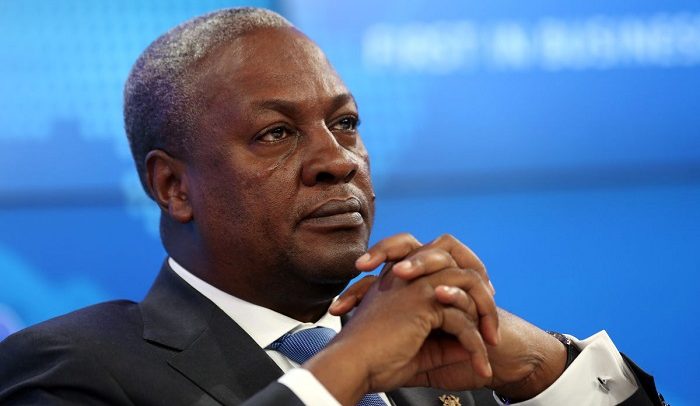John Mahama
Without a shred of hyperbolic overkill, one can say it really is unnerving and heart-rending for this country’s fledgling democratic experiment that the Mahama-bankrolled National Democratic Congress (NDC) happens to be the major opposition party today. Fact is, the NDC party of ex-President J.D. Mahama (JDM), S. Ofosu-Ampofo and J. Asiedu Nketia, in many ways, are making mockery of the principle of the 21st century opposition or “government-in-waiting.” This NDC has no clue about what contemporary opposition means to functional democracy except “acid-mouth” insults.
Many concerned Ghanaians have pointed out already, and it still needs to be pointed out over and over that these NDC “fat cats” just don’t get it. They do not truly understand that opposition concept under representative democracy as we have in Ghana today isn’t synonymous with selfishness, pettishness, disinformation, icky propagandas, obstructionism, and of course, oppose, oppose, and oppose everything the government in power does, even if it’s in the interest of the whole nation.
Ever since his amateurish regime was sent packing into the opposition after the 2016 general elections, JDM-commandeered main opposition party has become so bitter as a result of the unexpected defeat, and has quickly transformed itself into a party of No and obstructionism. Ironically, for almost every conceivable public policy by the ruling government led by Nana Akufo-Addo, the opposition NDC led by JDM was for a policy yesterday before it was against it today, because letting Ghanaians know that a certain policy implemented by the present regime is good, will most likely dim the electoral chances of the ex-President Mahama’s 2020 “third coming” agenda.
Let’s consider the ongoing national debate about the future of Metropolitan, Municipal and District Chief Executives (MMDCEs). If critical thinking prevails here, and the emotional layers of hyper-partisanships and the self-serving mindsets are peeled off, Ghanaians will find out President Akufo-Addo’s push for the elections of the MMDCEs on “partisan” basis is nothing more than an enrichment of this nation’s democratic experiment.
More significantly, the “Sage from Kyebi” suggestion that the MMDCEs be subjected to the so-called partisanship yet on merit-based open elections, in several ways, is an indictment to the winner-takes-all political culture bequeathed to this country by a one-person-military-centric 4th Republic Constitution. Although many Ghanaians—educated and uneducated alike—delude themselves into believing that Ghana’s current system of government is modeled along the lines of “limited presidency”, a closer scrutiny reveals the governance actually is more satiated toward unitary form of government.
Expressed in different ways, Ghana’s 4th Republic Constitution cedes too much power to the executive president, although Ghanaians think the country has coequal branch of government. Keep in mind when the 4th Republic Constitution was adopted in the early 1990s, the nation was under one-man military rule; and so it was a no-brainer ruling document that was created back then, would most likely reflect the political values and ideologies of that era. The ex-president, Rawlings, who commissioned the “executive-centered” constitution the nation is steadfastly relying on, has long come out to point out the built-in flaws of the supreme law of this land.
It is why on his part as a true advocate of representative democracy, President Akufo-Addo has also realized that genuine democratic governance entails an active participation of the citizens’ ability to freely contest and run for elected office under any party of the contestant’s choice. This presupposes that the proposed election of the MMDCEs is the best political deal any critical thinker who has a good apprehension of the vagaries of modern democracy, and more so has mortal hatred for the winner-takes-all concept shouldn’t raise any objection here.
So, the question worth exploring is: why do former President Mahama and his clueless lieutenants oppose and obstruct everything initiated or implemented by the current regime of President Addo? Is it out of cynicism, resentfulness, pull-him-down mentality in the name of opposition, or it is simply that “if I couldn’t do it then I will not allow anyone else to do it and get credit/praise to his or her name?” In plain terms, the caliber of opposition Ghanaians are experiencing under Mahama’s NDC is pathetic; suffice it to say it thrives on self-absorbedness in one-dimensional context in that it is all about how the “umbrella fraternity” can wrestle power from Nana Addo’s NPP administration.
Let the truth rings loud and clear: JDM’s desperate attempt at his “third coming” in 2020 is never geared toward the supreme interests of the ordinary Ghanaians more than it is about JDM’s messianic egos, and the fact that his massive electoral defeat was seen by him as an aberration. Hence, he strongly believes he has a point to prove that Nana Akufo-Addo’s victory over him (JDM) in 2016 was an accident of history; and that “history” will prove him right in December 2020.
It is too bad that majority of Ghanaians are smart people but at times they allow themselves to be taken for a rough disinformation ride and deceived by “only-me-alone-can-fix-Ghana’s problems” former President John D. Mahama. If people are talking about the MMDCEs becoming too “partisan” because of the proposed elections, what is more partisan than the president choosing his own people/party activists as district executives?
After all, the Article 2431 of the country’s Constitution empowers the president to select most of the MMDCEs, and JDM and his followers know this fact. So, why is the low-down NDC pretending as if the world is about to explode because of President Akufo-Addo’s selfless suggestion about electing the MMDCEs to try to encourage the decentralization of political power? Certainly, extreme hunger for power appears to have blinded ex-President Mahama and his party to some practical facts of life.
Bernard Asubonteng is a US-based writer and Ph.D. student of public/US foreign policy
By Bernard Asubonteng


